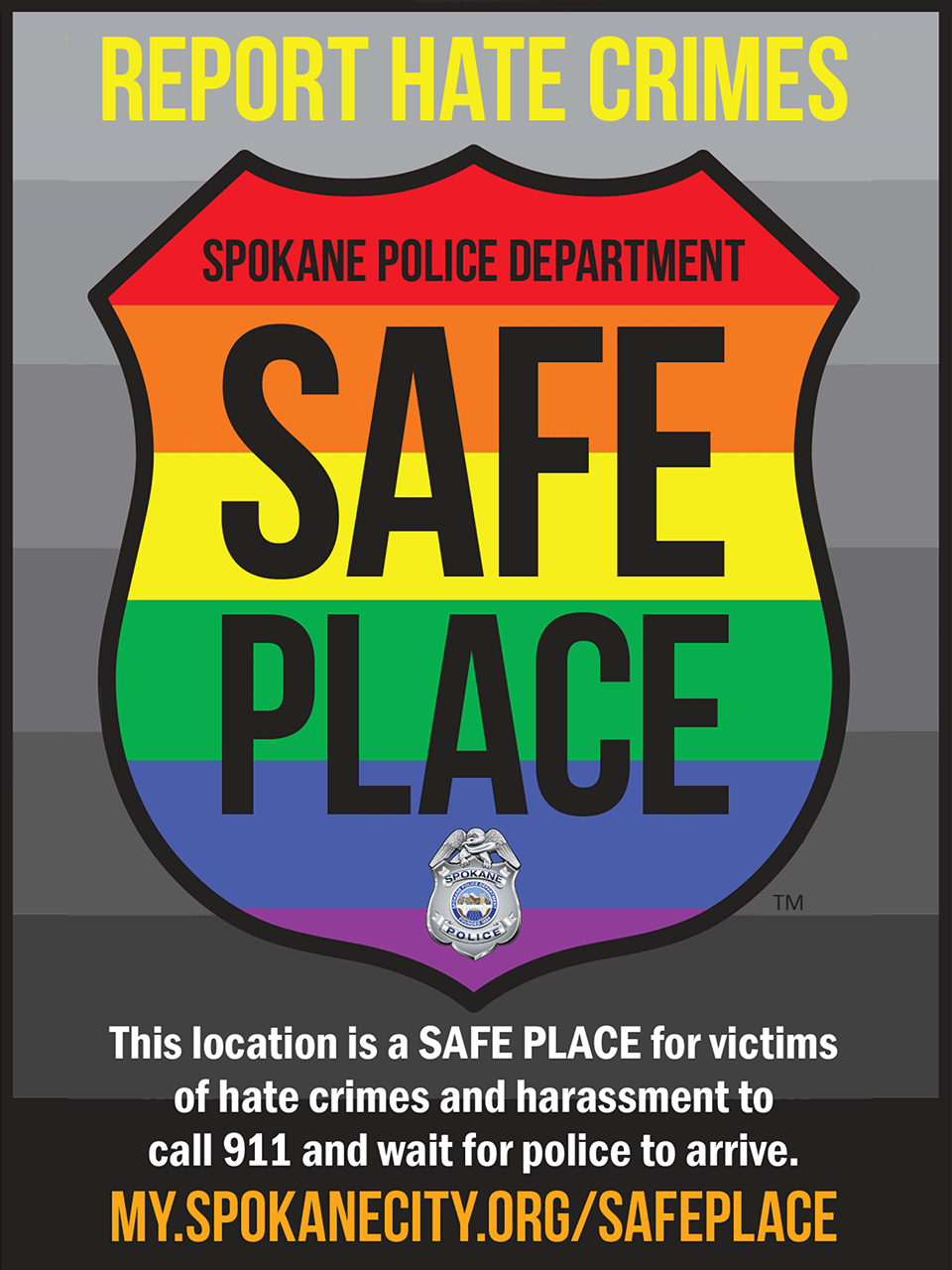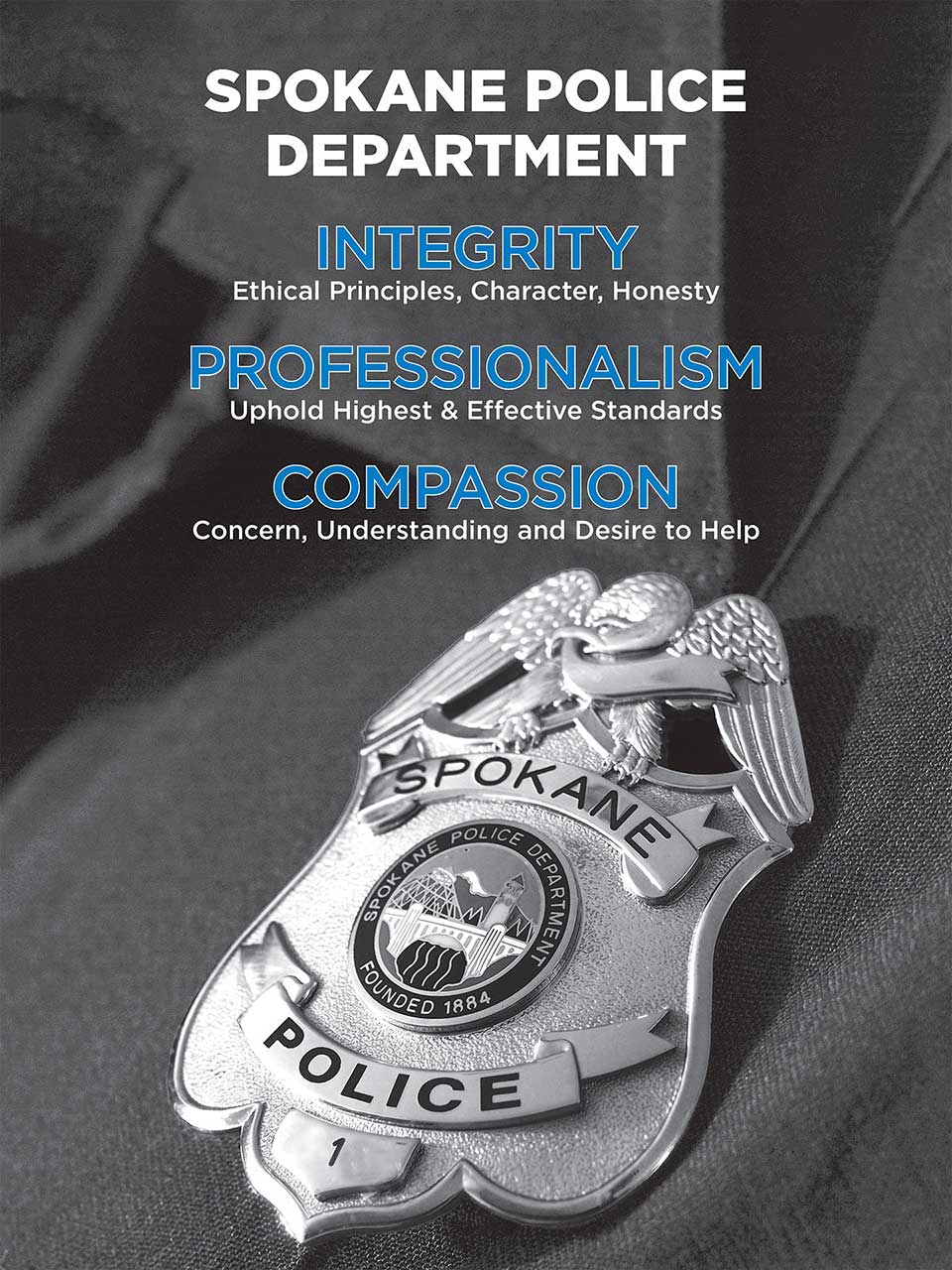Safe Place Program
In 2020, the City of Spokane Police Department was approached by our local PFLAG chapter regarding implementing the Seattle Safe Place Program in Spokane. PFLAG is the largest and oldest LGBTQ+ support organization in the nation. After reviewing the Seattle Police Department's innovative program, the Spokane Police Department began working on implementing Safe Place. The Spokane Police Department reviewed and updated our policies - adding changes in the law from 2019 to already established procedures to thoroughly investigate hate crimes. Officers were provided additional training and resources regarding hate crimes and protected groups to augment SPD's existing training.
At the Spokane Police Department we provide service to all members of our community. We seek to bridge gaps with all communities and look for new ways to serve everyone.
Spokane Police Officers are expected to treat all members of the public with dignity and respect. As part of this program we would like anyone reporting a Hate Crime to know:
- We take your complaint seriously and we will investigate hate crimes as reported.
What is the Spokane Safe Place Program/Initiative?
It's an agreement between businesses, the police department and the community to report crimes (especially hate crimes) and provide a place for victims to safely wait for police. Business owners request a decal to display near their front door to highlight their commitment to and participation in the initiative. Participating businesses agree to report crimes and are required to train employees, volunteers, and staff on the reporting of crime, especially hate crimes. Businesses agree to allow a victim/complainant to wait inside their location for police arrival.
The program is not complicated and training is simple. The Seattle Police Department website provides training videos (see below). Documentation to assist in training employees will also accompany a decal, upon request.
The decal should be prominently displayed 3'-5' from the ground and near the front door.
The Seattle Safe Place Program
We would like to thank the Seattle Police Department for allowing us to implement their Safe Place initiative. Language, concepts, and terms have been liberally borrowed from Seattle's publications and website regarding the Seattle Safe Place Initiative.
What is a Hate Crime?
A person is guilty of a hate crime offense if he or she commits any of the following acts because of his or her perception of the victim’s race, color, religion, ancestry, national origin, gender, sexual orientation, gender expression or identity, or mental, physical, or sensory disability:
- Causes physical injury to the victim or another person;
- Causes physical damage to or destroys the property of the victim or another person; or
- Makes threats that causes a person or group to have reasonable fear of harm to their person or property.
See the legal RCW Definition below:
RCW 9A.36.080
Hate crime offense—Definition and criminal penalty.
-
A person is guilty of a hate crime offense if he or she maliciously and intentionally commits one of the following acts because of his or her perception of the victim's race, color, religion, ancestry, national origin, gender, sexual orientation, gender expression or identity, or mental, physical, or sensory disability:
- Causes physical injury to the victim or another person;
- Causes physical damage to or destruction of the property of the victim or another person; or
- Threatens a specific person or group of persons and places that person, or members of the specific group of persons, in reasonable fear of harm to person or property. The fear must be a fear that a reasonable person would have under all the circumstances. For purposes of this section, a "reasonable person" is a reasonable person who is a member of the victim's race, color, religion, ancestry, national origin, gender, or sexual orientation, or who has the same gender expression or identity, or the same mental, physical, or sensory disability as the victim. Words alone do not constitute a hate crime offense unless the context or circumstances surrounding the words indicate the words are a threat. Threatening words do not constitute a hate crime offense if it is apparent to the victim that the person does not have the ability to carry out the threat.
-
In any prosecution for a hate crime offense, unless evidence exists which explains to the trier of fact's satisfaction that the person did not intend to threaten the victim or victims, the trier of fact may infer that the person intended to threaten a specific victim or group of victims because of the person's perception of the victim's or victims' race, color, religion, ancestry, national origin, gender, sexual orientation, gender expression or identity, or mental, physical, or sensory disability if the person commits one of the following acts:
- Burns a cross on property of a victim who is or whom the actor perceives to be of African American heritage;
- (b) Defaces property of a victim who is or whom the actor perceives to be of Jewish heritage by defacing the property with a swastika;
- (c) Defaces religious real property with words, symbols, or items that are derogatory to persons of the faith associated with the property;
- (d) Places a vandalized or defaced religious item or scripture on the property of a victim who is or whom the actor perceives to be of the faith with which that item or scripture is associated;
- (e) Damages, destroys, or defaces religious garb or other faith-based attire belonging to the victim or attempts to or successfully removes religious garb or other faith-based attire from the victim's person without the victim's authorization; or
- (f) Places a noose on the property of a victim who is or whom the actor perceives to be of a racial or ethnic minority group.
This subsection only applies to the creation of a reasonable inference for evidentiary purposes. This subsection does not restrict the state's ability to prosecute a person under subsection (1) of this section when the facts of a particular case do not fall within (a) through (f) of this subsection.
- It is not a defense that the accused was mistaken that the victim was a member of a certain race, color, religion, ancestry, national origin, gender, or sexual orientation, had a particular gender expression or identity, or had a mental, physical, or sensory disability.
- Evidence of expressions or associations of the accused may not be introduced as substantive evidence at trial unless the evidence specifically relates to the crime charged. Nothing in this chapter shall affect the rules of evidence governing impeachment of a witness.
- Every person who commits another crime during the commission of a crime under this section may be punished and prosecuted for the other crime separately.
- For the purposes of this section:
- "Gender expression or identity" means having or being perceived as having a gender identity, self-image, appearance, behavior, or expression, whether or not that gender identity, self-image, appearance, behavior, or expression is different from that traditionally associated with the sex assigned to that person at birth.
- "Sexual orientation" means heterosexuality, homosexuality, or bisexuality.
- "Threat" means to communicate, directly or indirectly, the intent to:
- Cause bodily injury immediately or in the future to the person threatened or to any other person; or
- Cause physical damage immediately or in the future to the property of a person threatened or that of any other person.
- Commission of a hate crime offense is a class C felony.
- The penalties provided in this section for hate crime offenses do not preclude the victims from seeking any other remedies otherwise available under law.
- Nothing in this section confers or expands any civil rights or protections to any group or class identified under this section, beyond those rights or protections that exist under the federal or state Constitution or the civil laws of the state of Washington.
How to Participate
The SPD Safe Place is a program designed to assist victims of crimes, especially those of hate/bias crimes, and to encourage the reporting of these crimes.
This is a program designed for business participation only. If your business would like to participate they must do the following:
- Order a decal. (1 per location/request)
- Commit to Safe Place principles.
- Educate yourself and your employees/staff about the Spokane Safe Place.
- SPD Reporting Hate Crimes Pamphlet (PDF 423 KB)
For additional information contact Sergeant Trevor Winters, Spokane Safe Place Coordinator, at SPDCommunityOutreach@spokanepolice.org.
Order a Decal Form
To order a decal, please fill out the form below:
Know the Number
Emergency Services
Situations requiring IMMEDIATE ASSISTANCE from Police, Fire or ambulance: call 911
Mental Health Crisis
Situations requiring IMMEDIATE ASSISTANCE by phone from trained mental health counselors: call 988
Crime Check
Non-emergency police services: call 509.456.2233 to report crimes no longer in process or submit crime tips.
Crime Check Online Reporting also available.
City Services
Non-emergency reporting of potholes, graffiti, or unlawful camping, utility billing, and general information on city services: call 311 or report online
Social Services
Social services and community resources like housing, food, and employment help: call 211
For general police email contact:
SPDWebMail@spokanepolice.org



